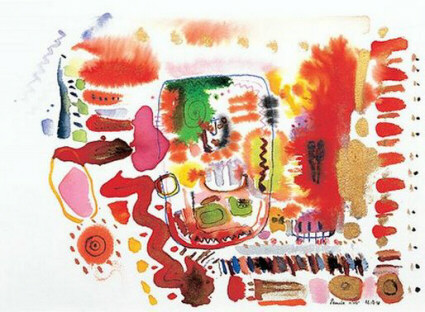after my hard drive crashed
 My hard drive and motherboard crashed. If you have experienced this breakdown of the extension of your memory, these tools which hold your information, you can feel with me how the invisible means of support of the cyber-world can be suddenly taken from you. This can give one a moment of computer-related depression -- and a grieving for the now-forever-lost files you failed to back up. And as you remember what you have lost, you want to do what you can to restore everything to the status quo ante quem so that your life may continue uninterrupted. And some of us try to do just that.
My hard drive and motherboard crashed. If you have experienced this breakdown of the extension of your memory, these tools which hold your information, you can feel with me how the invisible means of support of the cyber-world can be suddenly taken from you. This can give one a moment of computer-related depression -- and a grieving for the now-forever-lost files you failed to back up. And as you remember what you have lost, you want to do what you can to restore everything to the status quo ante quem so that your life may continue uninterrupted. And some of us try to do just that.
But imagine you had an old version of Windows, or DOS, or system 6 Mac, and now as you consider the restoration you can already get a Pentium motherboard, a faster netsurfing modem, and the latest edition of Windows XP, or Mac OS X. In fact you are not merely restoring everything as it was before. You are building a new and broader - even better - platform for your information base.
At the same time, you want to be sure that the new system can handle the old software applications, which you need to re-establish so that the backups will work back in. In other words, your new system has to be downward compatible while being the best you can get together at this time.
In the dimension of time, the workaholic in me is devastated. The frustration and sadness over all the lost data blocks everything but frantic casting about to get it all fixed. But now Shabbat comes and for the next 24 hours, I can’t do very much and I must shift. So as I awaken to dimensions of time beyond the workplace, I can see my weekday calamity in a larger field. Entering in to the world of the Mashal Haqadmoni, the Primal Myth, I begin musing on Jewish History, on the mythic dimensions that hold our world together, and begin to move from Mashal to Nimshal, parable to meaning. Now it seems to me that this has something to do with the process of Tikkun Olam and renewal. To permit a pun, the digital world of the computer became for me a great analogue.
My first computer, with the awesome memory of 36 K and a cassette tape drive to save the data, was a revelation for me. Now, word processing software had the power to take the written Torah of paper and ink and make it flexible -- soft-ware -- as if it were Oral Torah. The mind of the computer freed me from the fundamentalism of the script once written. Once, working with paper meant a messier page for every round of editing. Now, each time I corrected copy on that primitive word processor it looked cleaner and better than before.
The came my experience with an Apple II+, and PRODOS. Now I could put in more memory and cards that could do all sorts of things I never could do before. I could now use peripherals that had formerly been out of bounds. My capacity for data -- da'at -- would be larger than before. But taking the files from my old 36 K Exidy Sorcerer (that was its name) was not easy. Emulation was cumbersome since the file formats were not compatible. Eventually I succeeded, although emulation is never an exact replica.
 I see the aptly-named Sorcerer as an analog for pre-patriarchal Judaism -- what we used to call paganism: Chaldean, Egyptian and Canaanite religion. With Abraham and Moses we got to Apple's PRODOS. Many programs that worked before were incompatible with ours. With others, the work of emulation caused the new computer to crash. The deeds of the land of Egypt which you have left, and those of the land of Canaan which you are about to enter -- these you are not to do.
I see the aptly-named Sorcerer as an analog for pre-patriarchal Judaism -- what we used to call paganism: Chaldean, Egyptian and Canaanite religion. With Abraham and Moses we got to Apple's PRODOS. Many programs that worked before were incompatible with ours. With others, the work of emulation caused the new computer to crash. The deeds of the land of Egypt which you have left, and those of the land of Canaan which you are about to enter -- these you are not to do.
Eventually, however, PRODOS also became obsolete. It couldn't handle the new applications coming from Greece and Rome, with their graphical user interfaces and, of course, the mouse. Even before the crash of the Second Temple, the old Sadducean PRODOS had become corrupted, and suddenly there was a new system on the block: MS-DOS, the Pharisaic OS now locked in a Kulturkampf for who would control the shared and common standard. The end or co-option of the line of priests (Jobs and Wozniak) ensured that the Pharisees would prevail.
Who could resist the lure of MS-DOS -- Emmes-Dos (Emmet Dat in Sephardic pronunciation), truth and religion? Once learned, it proved much more flexible than either the Exidy’s CPM or Apple’s PRODOS. New manipulations of text and data as well as communication were now possible, and da'at was more portable than before. At the same time, the lingo was neither intuitive or accessible. This was the Talmudic era of my computer life, the time of the rabbinic hegemony, and now there were things I never could do myself. I needed a maven, a meivin, someone who understands -- in short, a computer rabbi, to steer me through the shoals of error messages. The Halakhah of the software incompatibilities that froze my computer had to have its dairy and meat separated. I needed a virus detector to keep my drive - the bayit of my bytes -- kosher. And every year, at least twice - before Rosh Hashanah and before Pesach -- I needed to delete old obsolete files and clean up my drives.
And there were different alternatives on how to do that. Amiga, Atari - there were many systems that tried to gain ground within Judaism, but eventually went their separate ways. Yet we remained faithful, staying with MSDOS on our PC clones, added Gaonic enhancements, database managers like the Shulhan Arukh, theological spreadsheets to Guide the Perplexed, Midrashic word processors, capable of making a variety of PARDES formats.
Taking the files from the past and installing them in the new environment became increasingly easier. Luckily, Windows 3.1 could be patched on to MSDOS and that still was Kosher. This is how Orthodoxy has managed to claim that it made only an update (hiddush) and not a change (shinnui). And look what riches it has produced! ArtScroll alone has given us access in English to immense treasures from the past



A Parable after my hard drive crashed
Zalman Schachter-Shalomi
Christmas in Jerusalem
Jay Michaelson
Carobs
Elisha Porat
Dear Mr. Pinter
Dan Friedman
The Nuclear Physicist Gives his Son a Haircut
Hanan Harchol
Brodsky Begins, Part Two
Adam Mansbach
Archive
Our 870 Back Pages
Zeek in Print
Subscribe now!

About Zeek
Mailing List
Contact Us
Subscribe
Tech Support
Links

From previous issues:
The Mall Balloon-Man Moment of the Spirit
Josh's Dinner in the Cafeteria
Keri HaRishon
Dan Friedman
Josh Ring
Bruce Lokeinsky